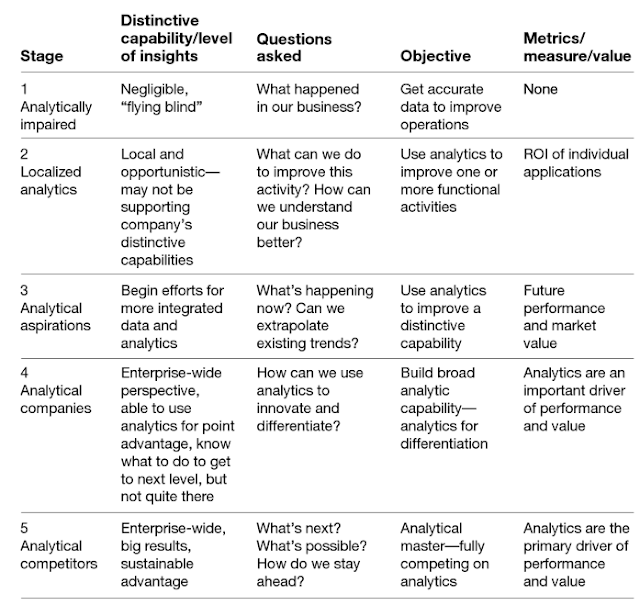It’s the time of year when people make resolutions and goals about the coming year. Regardless of how you feel about them, it can be a valuable exercise to check in with yourself, reflecting on where you are and where you want to go. It's just as important to do this with your team. The analytical maturity model can help when assessing your data use and guide you to becoming more data-driven.
Analytical Maturity Model
Many have written about the model, so I will not describe it in depth, but here is a blog post that briefly defines each step. The original model, produced by Gartner in 2012, only has 4 steps, but the blog post I just shared adds a 5th step, which incorporates machine learning. The goal is to move up the model to become an analytical competitor through the strategic use of data. But you cannot skips steps as each one builds on the previous step.
You cannot try to understand why something happened without first identifying what actually happened. Just as you can't predict what will happen next without knowing what already happened and why.
So don't rush through the first steps on your way to build machine learning models. Not only will you fail in your pursuit, you will fail to act on very simple results. Most organizations I have seen spend much of their energy looking at reports and analyses from the first two steps, as they are critical to the business. Also, there are times where building operational reports is the extent to which a team works with data, and that's okay too!
Stages of Analytical Competition
You can probably look at this model and roughly identify where along it your team, department, or organization lies. To help identify what step you're currently at and how to get to the next step, understanding the qualities of those at each step would be helpful. For this, I turn to the book Competing on Analytics, which lays out 5 stages of analytical competition and closely aligns with the maturity model above. I could describe each stage, but I highly recommend you read the book! You can find a summary here and a descriptive table below. The objective column in the table helps to determine what area you may want to invest in to get to the next level of the maturity model.
While this table and associated book are helpful in outlining ways to better leverage analytical capabilities, there are other components involved in your analytical success. As Gartner lays out in this article, not only do you need an analytical strategy, but also good people, governance, and technology.
Analytical IQ
The book Secrets of Analytical Leaders goes further by laying out a self-assessment based on four qualities:
- Analytical Maturity: this is essentially what I laid out at the beginning of this post
- Data Maturity: this categorizes where data resides within your organization and is a critical component to moving up the maturity model (it would be difficult to learn something new from your data if it's spread out all over the place)
- Analytical Culture: this defines how those within your organization view data and analytics (if the data arrives late, how frustrated will people be?)
- Scale and Scope: this outlines how widespread data is shared (when an awesome insight is found, is it emailed around and shared externally?)
Putting it All Together
Now that you are equipped with many tools to assess where you are at in your analytical journey, it's time to figure our where you're going. I've personally used all of these resources to conduct assessments for individual teams. As a result, I was able to provide recommendations on future projects, things they can do to set themselves up for success. Examples include:
- Centralize data in a single system to facilitate more complex analyses
- Build a externally facing portal for customers
- Take DataCamp courses about forecasting
- Organize reports into a clear structure to increase adoption








